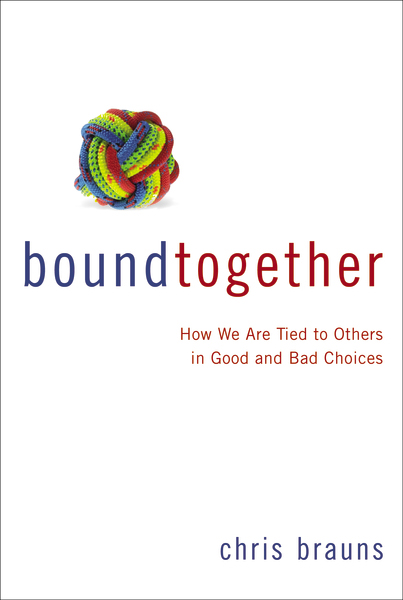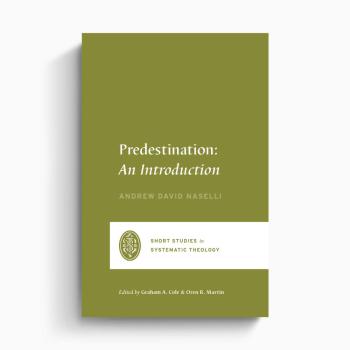Review of Bound Together: How We Are Tied to Others in Good and Bad Choices by Chris Brauns
As Americans, we love our independence. I am my own man (or woman), I make my own destiny, I am autonomous, don’t tread on me. But for all our cowboy sentiment, there is a union, communion, and solidarity to humanity that we cannot escape. Despite my wish to the contrary, I am not solely my own man—I am affected by the choices of others. I benefit from the good choices of others (through no merit of my own), and I and those I care about suffer as a result of the bad choices of others (through no discernible fault of our own).
We see this everywhere. Sometimes it’s a good thing—good leaders make good choices, and their followers enjoy the benefits. Philanthropists donate money that blesses others. Parents love and nurture and sacrifice for their children. But other choices result in far more tragic outcomes. A bunch of bankers and other investment types get greedy and make bad choices about home loans, and millions suffer financial hardship when the bubble bursts. A pregnant mother chooses to ingest substances harmful to her developing child, and the child is plagued by crippling defects and diseases—if the child lives at all. An evil man victimizes children who trust him, and the children carry that pain, that violation, with them their whole lives. A teenager decides to take his or her own life, and friends and family members are rocked by heartache and guilt. A violent man walks into a school, his mind bent on death and destruction, and shell-shocked parents are left to mourn the sudden loss of their beloved children. The leader of one nation lashes out at another, and millions of civilians are caught in the crossfire.
We hate this. Or I do, at any rate. Why should my well-being be dependent on the decisions of another? It’s unfair. It violates our sense of justice. After all, as the Bible itself says, ‘The soul who sins must die.’ (Ezekiel 18:20) I should only be responsible for—only be affected by—my own choices. If I didn’t do it, why am I left with the consequences?
In this fascinating, insightful, and well-written book (which I highly recommend), author and pastor Chris Brauns explores the corporate nature of life and faith—that is, the connectedness between and among people whereby we are, well, ‘bound together’ in what Brauns calls ‘the rope principle.’
This principle rang chillingly true as I read this book against the tragic backdrop of the Boston bombings. If there is a clearer picture of our vulnerability to the aftermath of others’ choices, I don’t know what it could be. An unhinged terrorist plants bombs in the midst of unsuspecting citizens—he makes a choice, and despite any claim to autonomy or independence, others suffer the consequences. Lives are ripped apart—many lives—because of someone else’s choice.
As much as we want to only be judged, only be punished, or only be rewarded for the actions we ourselves have taken or the choices we ourselves have made, the fact remains that we are all connected.
For Brauns, this ‘rope’ principle has far-reaching implications—for Christians especially. As Brauns points out, we are all bound to Adam in his sin, doomed by the Fall to a life corrupted, tainted, and ultimately destroyed by the sin nature we inherited from our forefather. He ate the fruit, and we are condemned. He was our representative, and his choice affects us. We may not understand how, or why. We may object to this state of affairs. But if we take an honest look at the world around us, I don’t think we can deny its reality. Something is rotten in the state of Denmark, and it has been rotten for a very long time. Whether we like it or not, our nature is corrupt—the very fact that we strive to acquire something called ‘self-discipline’ is itself evidence that our selves cannot be trusted to desire rightly. We are bound to Adam in his sin. (Romans 5:12-21) We are sinners, and we prove it every single day.
This is difficult stuff—as Brauns is quick to admit; understanding the nuances and mechanics of the doctrine of original sin is no easy task. However, Scripture makes it clear that because of Adam’s rebellion against God, all are counted—and behave—as rebels.
Fortunately, the story doesn’t end there. The same principle that binds us to Adam and to our doom has the potential to bring us the salvation we so desperately need. For Adam is not the only one to whom we can be bound. There is another option. Where the first Adam chose rebellion, the Second Adam—the God-man Jesus Christ—chose obedience. He lived a perfect, sinless life in submission to God the Father. And when the time came, He was obedient unto death, even death on a cross. The penalty Adam earned—the penalty that, by extension, was to be exacted from each and every one of his descendants—was marked paid in full. One Man’s good choice has the power to affect all who are bound to Him. (Romans 5:12-21)
And this isn’t just a ‘Get Out of Jail Free’ card. We who are bound to Christ experience the blessing of union with Him now. Brauns explores a number of Biblical images illustrating this union: cornerstone and building, husband and wife, head and body, vine and branches, father and son. We are united to Christ, and we participate in the rewards of His choices.
Brauns also includes a few chapters applying the ‘rope principle’ to specific relational contexts—the local church body, marriage relationships, family relationships, and even the individualistic American culture. However, it was his discussion of our union with Adam—and our subsequent union with Christ—that most struck me. The same principle that dooms us is the principle that allows us to be saved. We may feel, at times, that we are unjustly subjected to the consequences of others’ actions—whether it be the original sin resulting from Adam’s disobedience or the fact that our boss’s boss’s boss chose to embezzle funds, leading to the bankruptcy of the company and our own (undeserved) unemployment.
But when the ‘rope principle’ rankles, we would do well to remember that the Gospel depends on this exact inequity—we are subjected to the consequences of the actions of Another. And in a sense, this is also unjust—far more unjust, indeed, than our temporal suffering at the hands of others and their choices, for we are far more ‘deserving’ of the negative consequences of others’ sin than we are deserving of the positive consequences of Christ’s obedience. After all, all acts of grace or mercy are, on some level, unjust. Yet, this ‘unjust’ act is also perfectly consistent with—and indeed, the most striking and beautiful picture of—the perfect justice of God.
The same rope that binds us to Adam in sin and death can, by faith, bind us to Christ in life and holiness. But the two, though based in the same principle, are far from equal. As Brauns notes,
The blessing of God’s love is greater than the curse of sin. The negative and positive applications of the principle of the rope are not symmetrical. Our solidarity in Christ is more powerful than our solidarity in sin with Adam (p. 84)
Amen.
_______________________________________________________________
Alexis Neal is an attorney in the Washington, D.C., area. She regularly reviews young adult literature at www.childrensbooksandreviews.com and everything else at quantum-meruit.blogspot.com.
[Disclosure of Material Connection: I received this book free from the publisher through the BookSneeze®.com book review bloggers program. I was not required to write a positive review. The opinions I have expressed are my own. I am disclosing this in accordance with the Federal Trade Commission’s 16 CFR, Part 255: “Guides Concerning the Use of Endorsements and Testimonials in Advertising.”]












